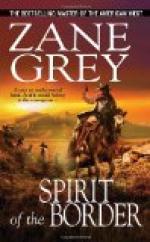“Then hunting Indians is his sole occupation?”
“He lives for that purpose alone. He is very seldom in the settlement. Sometimes he stays here a few days, especially if he is needed; but usually he roams the forests.”
“What did Jeff Lynn mean when he said that some people think Wetzel is crazy?”
“There are many who think the man mad; but I do not. When the passion for Indian hunting comes upon him he is fierce, almost frenzied, yet perfectly sane. While here he is quiet, seldom speaks except when spoken to, and is taciturn with strangers. He often comes to my cabin and sits beside the fire for hours. I think he finds pleasure in the conversation and laughter of friends. He is fond of the children, and would do anything for my sister Betty.”
“His life must be lonely and sad,” remarked Joe.
“The life of any borderman is that; but Wetzel’s is particularly so.”
“What is he called by the Indians?”
“They call him Atelang, or, in English, Deathwind.”
“By George! That’s what Silvertip said in French—’Le Vent de la Mort.’”
“Yes; you have it right. A French fur trader gave Wetzel that name years ago, and it has clung to him. The Indians say the Deathwind blows through the forest whenever Wetzel stalks on their trail.”
“Colonel Zane, don’t you think me superstitious,” whispered Joe, leaning toward the colonel, “but I heard that wind blow through the forest.”
“What!” ejaculated Colonel Zane. He saw that Joe was in earnest, for the remembrance of the moan had more than once paled his cheek and caused beads of perspiration to collect on his brow.
Joe related the circumstances of that night, and at the end of his narrative Colonel Zane sat silent and thoughtful.
“You don’t really think it was Wetzel who moaned?” he asked, at length.
“No, I don’t,” replied Joe quickly; “but, Colonel Zane, I heard that moan as plainly as I can hear your voice. I heard it twice. Now, what was it?”
“Jonathan said the same thing to me once. He had been out hunting with Wetzel; they separated, and during the night Jonathan heard the wind. The next day he ran across a dead Indian. He believes Wetzel makes the noise, and so do the hunters; but I think it is simply the moan of the night wind through the trees. I have heard it at times, when my very blood seemingly ran cold.”




